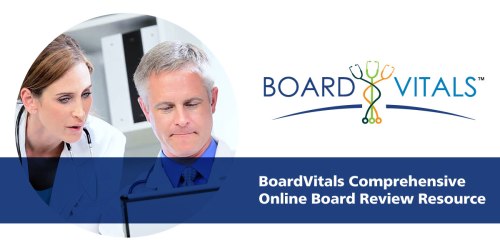Now available from STAT!Ref is a brand new BoardVitals question bank for Hospital Medicine Maintenance of Certification. This new test bank prepares users to pass the Hospital Medicine Recertification Exam. They will gain access to more than 1,500 Hospital Medicine MOC board review practice questions with detailed explanations for both correct and incorrect responses.
The Hospital Medicine MOC question bank follows the exam content outline for the American Board of Internal Medicine (ABIM) Focused Practice in Hospital Medicine MOC Exam. Those subscribers that already have access to the all medical specialties package, please note that you will see this new question bank in you subscription automatically.
Please see the BoardVitals Hospital Medicine handout and below for more details about this new MOC test bank.
Hospital Medicine MOC Board Review Topics Covered
- Cardiovascular disorders
- Pulmonary disease and critical care medicine
- Gastroenterologic and hepatic disorders
- Nephrologic and urologic disorders
- Endocrinologic disorders
- Hematologic and oncologic disorders
- Neurologic disorders
- Allergic, Immunologic, Dermatologic, and Rheumatologic Disorders
- Palliative care, Medical ethics, and Decision‐making
- Consultative Co‐Management
- Quality, Safety, and Clinical Reasoning
What is a Hospitalist?
According to the American College of Physicians, Hospital medicine is a type of practice within internal medicine in which the clinical focus is caring for hospitalized patients. Internists practicing hospital medicine are frequently called “hospitalists.” Although not all hospitalists are required to be internists, the nature of internal medicine training uniquely prepares internists for hospital medicine practice. As a result, the vast majority of hospitalists are trained in internal medicine, usually general internal medicine.
The discipline of hospital medicine grew out of the increasing complexity of patients requiring hospital care and the need for dedicated clinicians to oversee their management. The hospitalist model supplanted the traditional method of caring for hospitalized patients, which was often done by clinicians also seeing ambulatory patients or with other clinical obligations that limited their ability to provide the intensity of care often required by these patients. By focusing their practice on this specific group of patients, hospitalists gain specialized knowledge in managing very ill patients and are able to provide high-quality, evidence-based, and efficient patient and family-centered care in hospital settings.
About the ABIM Hospital Medicine MOC Exam
According to the ABIM, the Hospital Medicine Maintenance of Certification exam is designed to evaluate the knowledge, diagnostic reasoning, and clinical judgment skills expected of the certified hospitalist in the broad domain of the discipline.
The exam emphasizes diagnosis and management of prevalent conditions, particularly in areas where practice has changed in recent years. As a result of the blueprint review by ABIM diplomates, the MOC exam places less emphasis on rare conditions and focuses more on situations in which physician intervention can have important consequences for patients. For conditions that are usually managed by other specialists, the focus is on recognition rather than on management. The exam is developed jointly by the ABIM and the American Board of Family Medicine.
See the ABIM Focused Practice in Hospital Medicine MOC Exam Blueprint for more details.
How Long is the Hospital Medicine MOC Exam?
The Hospital Medicine MOC exam lasts approximately 10 hours, which is divided into four sessions, each containing a maximum of 60 MCQs in single best answer format. In 2017, the First -Time Taker Pass Rate was 88% for Hospital Medicine MOC.
If you are not familiar with BoardVitals and its capabilities, please click here to view a short demonstration video, or click here to schedule a webinar to review BoardVitals and how your residents can benefit from this comprehensive and interactive exam prep tool.

